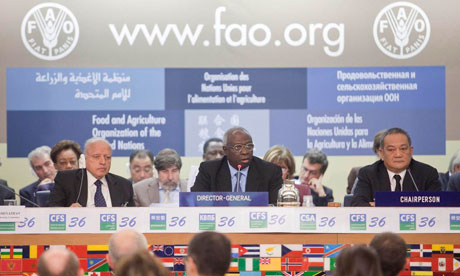The FAO's director general will be elected in four months, but we won't be told the selection process for this important position

Last week, the UN's Food and Agriculture Organisation (FAO) quietly announced its shortlist of six candidates for the role of director general. Quite how these six (all men) were selected, who knows? And, on what basis will the UN member countries vote for their preferred candidate? We, the public, shall never know; we'll just be told in four months' time. (The vote takes place at the FAO conference in Rome, which starts on 25 June.) In this age of turbo-charged people power, that is simply not good enough.
In a world where the food system is highly fragile, where food prices are increasingly volatile, and with new stressors from a changing climate, it is the hungriest who would bear the heaviest burden of a botched appointment.
One person does not make an organisation, but few organisations are effective with an ineffective leader. The FAO is just one part in a very complex food system, but it is the only part that has a mandate to make that overall system work better for the hungry and malnourished. However, the FAO is not the most highly rated of UN agencies. In fact, one person who wrote to me recently said that it does not matter who the next director general is because the FAO is irrelevant. But I believe that the FAO provides vital global public goods: things like information, standards, innovation and coordination. To provide these effectively it needs strong leadership with imagination.
The next FAO leader needs to be:
• relentless in not letting anyone forget about hunger and malnutrition. The FAO will need to find new ways to support global and national civil society, helping to develop new tools, such as responsive hunger surveillance maps, indexes that measure commitments of public and private groups to reduce hunger, and new tools to prioritise action against hunger and malnutrition in different contexts
• brave in taking on vested interests to prevent hunger and malnutrition by leading efforts to set standards around large, international land purchases, the production of biofuels and the deployment of ready-to-use foods for infants
• creative in supporting innovation to make science, technology and institutions focus more on the needs of those who still cannot afford diets that reduce malnutrition
• genuinely inclusive and non-territorial, forging strong relationships to deliver the best possible cooperation between the FAO and the other Rome-based UN food agencies (the World Food Programme and theInternational Fund for Agricultural Development).
If the voting process is not to descend into Eurovision Song contest-type balloting, we need answers from the candidates to questions such as: How do they see the external environment changing? What needs to be done? What should the FAO's role be? How would they transform the FAO to deliver that role?
And I have been collecting more questions from my cyber-correspondents, which I shall put in an open letter to each of the candidates. If any of the six reply, I shall publish their responses here. If we know the answers to these kinds of questions we can give our opinions to member states about who they should pick.
The six candidates, each nominated by his government, are: Franz Fischler (Austria), José Graziano da Silva (Brazil), Indroyono Soesilo (Indonesia), Mohammad Saeid Noori Naeini (Iran), Abdul Latif Rashid (Iraq) and Miguel Ángel Moratinos Cuyaubé (Spain).
We all have a stake in the vision and effectiveness of the FAO's next director general. We should all have a say in the appointment. The openness of the selection process must be more like the Egypt of 12 February than the Egypt of 11 February.






















No comments:
Post a Comment